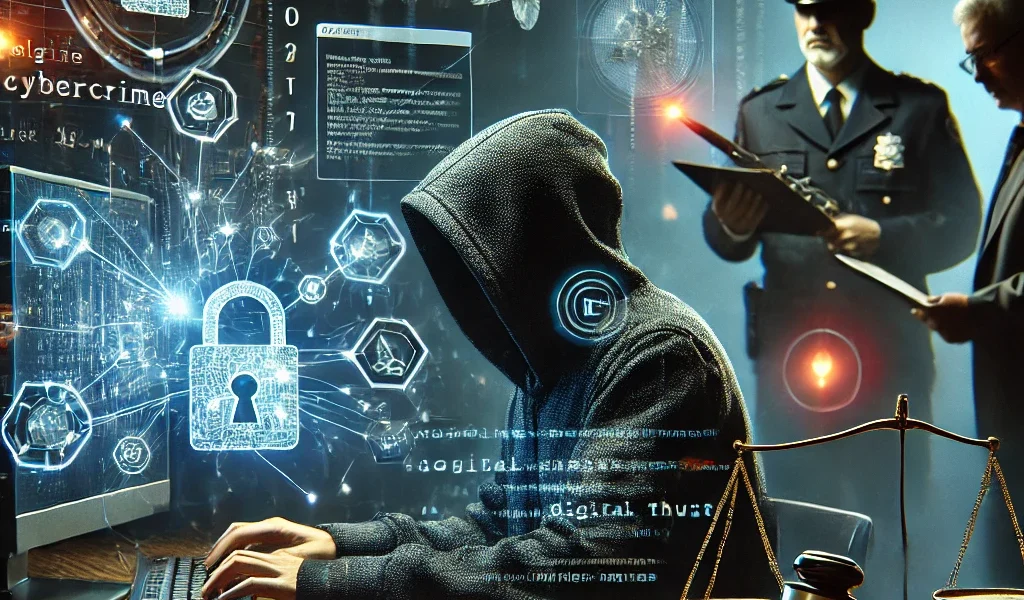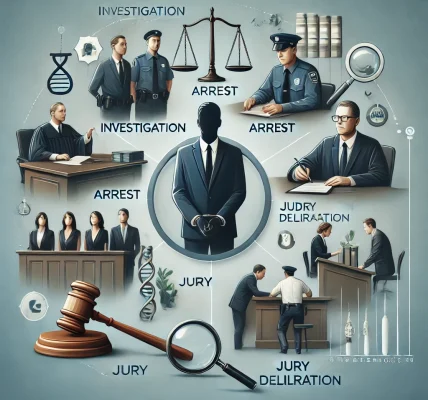Introduction
The rise of the internet has brought many conveniences, but it has also led to an increase in cybercrimes such as online fraud, hacking, and digital theft. These crimes affect individuals, businesses, and governments, leading to financial losses and security threats. Understanding cybercrime laws is crucial for staying protected and knowing the legal consequences of digital offenses.
1. What is Cybercrime?
Cybercrime refers to illegal activities carried out using digital technology, primarily over the internet. These crimes can range from financial fraud to identity theft, hacking, and cyberstalking. Governments worldwide have introduced strict laws to combat these threats and hold offenders accountable.
2. Types of Cybercrime
A. Online Fraud
Online fraud involves using deception to gain financial benefits. Some common types include:
- Phishing: Fraudulent emails or messages trick users into sharing sensitive information.
- Credit Card Fraud: Unauthorized use of a person’s credit card details for financial gain.
- Investment Scams: Fraudulent investment opportunities that deceive victims into handing over money.
B. Hacking
Hacking is unauthorized access to computer systems, networks, or data. It is classified into:
- White Hat Hacking: Ethical hacking done to identify security vulnerabilities.
- Black Hat Hacking: Malicious hacking aimed at stealing data, spreading malware, or damaging systems.
- Grey Hat Hacking: Unauthorized hacking that exposes vulnerabilities but is not necessarily malicious.
C. Digital Theft
Digital theft involves stealing digital assets such as personal data, intellectual property, or cryptocurrencies. Examples include:
- Identity Theft: Unauthorized use of personal information to commit fraud.
- Data Breaches: Unauthorized access to and theft of confidential information.
- Piracy: Illegal distribution of copyrighted materials such as software, music, and movies.
3. Cybercrime Laws and Regulations
Cybercrime laws vary by country, but most legal frameworks include provisions to penalize digital crimes. Some key laws include:
A. United States
- Computer Fraud and Abuse Act (CFAA): Criminalizes unauthorized access to computer systems.
- Electronic Communications Privacy Act (ECPA): Protects electronic communications from unauthorized access.
- Identity Theft and Assumption Deterrence Act: Penalizes identity theft.
B. European Union
- General Data Protection Regulation (GDPR): Protects personal data and privacy of individuals.
- EU Cybersecurity Act: Strengthens cybersecurity across member states.
- Directive on Attacks Against Information Systems: Addresses hacking and cyber-related offenses.
C. India
- Information Technology Act, 2000: Covers hacking, identity theft, and data breaches.
- Indian Penal Code (IPC): Includes provisions for cyber fraud and online harassment.
D. United Kingdom
- Computer Misuse Act, 1990: Criminalizes unauthorized access to computers.
- Fraud Act, 2006: Addresses online fraud and deceptive practices.
4. Legal Consequences of Cybercrime
Cybercriminals can face severe penalties depending on the nature and severity of the offense. Common legal consequences include:
- Fines: Monetary penalties imposed by courts.
- Imprisonment: Jail sentences ranging from months to years.
- Asset Seizure: Confiscation of illegally obtained assets.
- Ban on Internet Usage: In some cases, cybercriminals may be restricted from accessing the internet.
5. Preventing Cybercrime: Best Practices
While legal frameworks help combat cybercrime, prevention is always better than cure. Here are some essential cybersecurity measures:
A. For Individuals
- Use strong, unique passwords and enable two-factor authentication.
- Avoid clicking on suspicious links or downloading unknown attachments.
- Keep software and antivirus programs updated.
- Be cautious when sharing personal information online.
B. For Businesses
- Conduct regular cybersecurity audits.
- Train employees on recognizing phishing attempts and fraud.
- Encrypt sensitive data and use secure networks.
- Implement multi-layered security protocols.
6. Reporting Cybercrime
If you become a victim of cybercrime, report it immediately to the relevant authorities:
- United States: Federal Trade Commission (FTC), Internet Crime Complaint Center (IC3)
- European Union: Europol, National Cybercrime Units
- India: Cybercrime.gov.in, local police cyber cells
- United Kingdom: Action Fraud, National Cyber Security Centre (NCSC)
Conclusion
Cybercrime is a growing threat that requires strong legal enforcement and proactive security measures. By understanding cybercrime laws, individuals and businesses can better protect themselves from online fraud, hacking, and digital theft. If you suspect any cybercriminal activities, report them promptly to law enforcement agencies to ensure justice is served.
Cybersecurity is a shared responsibility. Stay informed, stay secure!




